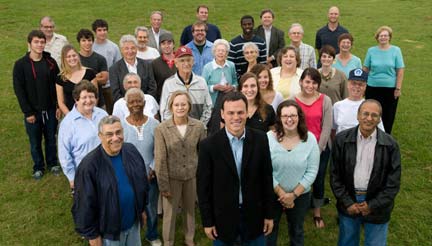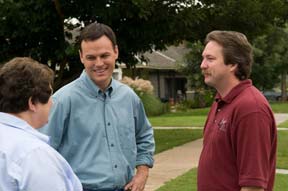|
Vol. 3, Issue #20 Oct. 24th - Nov. 7th, 2008
Looking Forward with Andrew Rice For the generation that came of age in the relatively peaceful and prosperous 1990’s, the events of that day were a wake-up call. A generation that had become accustomed to that peace and prosperity was forced to look at the world in a new way. Young men and women from all over the country suddenly found themselves at war halfway around the world. For many Americans, though, the events of 9/11/01 were not just a call to fight; the events of that day were a call to pay more attention to political and economic struggles both around the world and here at home. This generation that had taken safety, peace, and prosperity for granted was being called to service. To Andrew Rice, the call to public service was deafening. From Oklahoma City to Asia and Back The events of September 11 hit particularly close to home for Andrew. His older brother, David, lost his life in the attack on the World Trade Center. Andrew’s life would never be the same. In the face of such tragedy, Andrew rededicated himself to working on issues of public policy and serving the public interest. Like many other Americans, Andrew Rice had heard the call to service, and would not let that call go unanswered. Andrew joined other families who lost loved ones in the attacks to urge the Bush Administration to keep its eye on the ball in Afghanistan and re-focus the military efforts there to track down the terrorist network that perpetrated the heinous attack. Rice was also a vocal advocate for the creation of the 9/11 Commission to investigate and examine the events that led to the attack, so that we could be better prepared to prevent future attacks. Andrew returned to Oklahoma City in 2002, where he met and married his wife, Dr. Apple Newman Rice—a Pathologist at Integris Southwest Medical Center in Oklahoma City. The couple settled down in Oklahoma City to start a family. The Rices have two sons, three year old Noah and one year old Parker. A New Oklahoma Democrat If you watch television in Oklahoma, you’ve probably seen television ads by Andrew Rice’s opponent, incumbent Senator Jim Inhofe, which depict Andrew as some kind of scary, liberal bogeyman who is “against traditional marriage”, “for taxpayer funded abortions”, and letting criminals roam free on the streets. This false and misleading line of attack seems to be intended to paint Andrew Rice as the typical East Coast liberal who is out of touch with Oklahoma values. However, a look at his brief legislative history and his educational background shows Andrew to be anything but. While Andrew Rice may be relatively new to the political scene—he was first elected to the Oklahoma State Senate in 2006—he has quickly become a household name in Oklahoma City, evidenced by the loads of “Rice for U.S. Senate” signs dotting the landscape. Andrew has taken full advantage of his opportunity to serve in the Oklahoma Senate, involving himself in a host of legislative initiatives that highlight his new Democratic approach to politics. For example, Sen. Rice worked with Sen. Kris Steele, R-Shawnee, to create and pass the Oklahoma Food Security Act, which was signed by Gov. Brad Henry on June 6, 2008. The Food Security Act focuses on tax relief, improving school nutrition and providing improved incentives and coordination for access to food for all Oklahomans. Instead of creating another government bureaucracy, the Act is an attempt to address the problem of food insecurity—meaning families and individuals who do not receive enough daily nutrition to meet minimal medical benchmarks—in Oklahoma through a combination of tax relief for those most at risk of hunger, tax rebates for charities working to address the hunger crisis, and sales tax exemptions for local small farmers who sell their goods at farmers’ markets. A New Energy Future Despite the partisan rhetoric of Andrew Rice’s opponent, Jim Inhofe, that the threat of catastrophic global warming is the “greatest hoax ever perpetrated on the American people,” the scientific community is in agreement that global climate change is the result of human activity—mainly deforestation and the burning of fossil fuels. Rice sees this issue much differently than Sen. Inhofe. Rice believes that Oklahoma is positioned to be a leader in the new energy economy of the future. I caught up with Andrew Rice on October 21 and discussed the topic of the environment and the new energy future. When asked about his sense of Oklahomans’ concerns over global climate change, Rice noted that even Rupert Murdoch, who owns Fox News and the Wall Street Journal—not exactly a left-wing extremist—has pledged to make his corporation carbon neutral in 5 years. Rice said that this is an issue “we have to deal with, whether we want to or not…because the economic fallout from not dealing with it is going to be so terrible—let alone the responsibilities of conservation, air quality, and effects on agriculture.” Rice says Oklahomans see this issue as a “public health, economic, [and] self-interest” issue now, and that Oklahoma farmers are concerned with being “good stewards of the earth.” Rice also addressed Inhofe’s position on climate change and the new energy future: People are astounded that he is so unreasonable, but combined with Oklahoma being positioned as a natural gas state—which is part of the stepping stone in the right direction because it’s cleaner—and a new energy state with wind power and all the jobs that are created…we’re positioned to be a leader in the solution. So it’s sort of a two-part thing: 1) he’s so unreasonable, and 2) he keeps voting against incentivizing—with new tax credits and public spending to match private spending—for things that will grow the economy and help us get energy independent and move towards more sustainable ways of living. I asked Andrew whether he believes the new energy future also requires investment in infrastructural needs of public transit, especially light rail, in cities like Oklahoma City and Tulsa, he responded:
Rice went on to note that public investment in public works projects will also mean more jobs and business for Oklahoma. He said that “huge amounts of jobs will come online to build that infrastructure” necessary to carry electricity from wind farms in Western Oklahoma to other parts of the state and the country. He also noted that “those are jobs that have to happen in Oklahoma. You can’t export building utility lines.” According to Rice, the new energy future must be a public-private partnership. He believes both public investments and tax credits must be utilized to help spur entrepreneurship in clean technology investments. “The technology is there, but they’re just waiting for the tax credits to help incentivize them to bring it into the private sector,” Rice said. He says he has had investors tell him that Oklahoma is going to benefit from public investments and incentives to move Oklahoma forward into the new energy economy that will, in turn, attract venture capital to the state. On Small Businesses and the Middle Class “Oklahomans aren’t looking for a handout, they’re looking for a fair shake,” Andrew said. According to a report released on October 21, 2008 by the U.S. Congress Joint Economic Committee, Oklahomans are making $1,727 less per year than they were eight years ago, fewer jobs are being created than eight years ago, and 646,000 Oklahomans (or 18.4% of Oklahoma’s population) are without health insurance. Rice believes that addressing these problems requires tax relief for middle class families and small businesses, as well as lowering health care costs, which have risen 31.1% since 2000 according to the report. I’m talking about shifting our economic policies and tax-cut policies from big companies to small business, and from the top 10% income rate to middle class families. On small businesses, we want to be able to increase the tax credit for equipment costs and startup costs. Rice says he is generally supportive of Sen. Obama’s tax plan, which provides greater tax relief to the middle class, while allowing the Bush tax cuts for those who make more than $250,000 to expire—thereby reverting back to the same tax rates that were in place under President Clinton. However, he noted that he disagrees with Sen. Obama on whether to eliminate the estate tax. Sen. Obama opposes eliminating the estate tax, while Rice favors eliminating the estate tax over time. When pushed on the subject of the estate tax, which only applies to estates of over $1 million, Rice replied, “There are some [Oklahoma] businesses that are caught in it, and there’s a belief in Oklahoma that it’s a double taxation—that you’ve been taxed on that as income or investment income and then you’re taxed on it again when it’s going to be passed on down to the family.” On the “Bailout” (or is it “Rescue”?) Plan Rice says that while he was “in favor of something being done to keep local economic fallout from happening as a result of these bad decisions that were made and this recklessness [and] deregulation—that Inhofe supported throughout his whole career, not just the last eight years,” he would not have supported the bailout bill that was recently passed by Congress and signed into law by President Bush. He believes the bill “fell short” on accountability, and “it didn’t prevent future reckless lending because it didn’t fix the 1999 Financial Modernization Act that enabled [the crisis].” He also voiced concern about the lack of sufficient provisions in the bill to prevent corporate excesses and “golden parachutes.” Rice thought the bailout bill instead should have been created “as a network of firewalls around America to protect our pensions, to protect our lines of credit and local credit unions and banks, and to really just keep the fallout from affecting us. And to, frankly, let the bad decisions that were made in the free market—you know, the free market means you pay the consequences for your bad decisions, too.” Oklahoma in the 21st Century In 2008, we’ve seen Oklahoma City become a “big league city,” but it’s not clear that our Congressional leadership in Washington reflects the changes that are going on in Oklahoma. Sen. Inhofe is proud of the federal money he has secured for Oklahoma roads, but he has failed to recognize the economic and environmental importance of investing in and preparing for the new energy economy of the future. Andrew Rice is on a mission to give Oklahomans a chance to move forward and prosper in the 21st century. The question is, will Oklahomans give him that chance on November 4? |
||
©2006-2008 NONCO Media, L.L.C.

 Most of us remember exactly where we were that morning in 2001 when our country’s collective psyche was changed forever. The events of that day would come to dominate the political conversation for years, and would even be used as justification for wars in Afghanistan and Iraq that rage on to this day—never mind the fact that subsequent investigations have indicated that Iraq was not linked to the events of September 11, 2001.
Most of us remember exactly where we were that morning in 2001 when our country’s collective psyche was changed forever. The events of that day would come to dominate the political conversation for years, and would even be used as justification for wars in Afghanistan and Iraq that rage on to this day—never mind the fact that subsequent investigations have indicated that Iraq was not linked to the events of September 11, 2001.  Andrew Monroe Rice was born on April 23, 1973 in Oklahoma City. Rice attended high school at Casady in Oklahoma City. After high school, Andrew left Oklahoma to attend the historic and prestigious Colby College in Waterville, Maine where he earned a Bachelor’s Degree in Religious Studies. After college, Andrew traveled to Asia to work on rural development projects in impoverished towns and villages. After returning from his mission and development work in Asia, he attended Harvard Divinity School where he earned a Master’s Degree in Theological Studies in 1999.
Andrew Monroe Rice was born on April 23, 1973 in Oklahoma City. Rice attended high school at Casady in Oklahoma City. After high school, Andrew left Oklahoma to attend the historic and prestigious Colby College in Waterville, Maine where he earned a Bachelor’s Degree in Religious Studies. After college, Andrew traveled to Asia to work on rural development projects in impoverished towns and villages. After returning from his mission and development work in Asia, he attended Harvard Divinity School where he earned a Master’s Degree in Theological Studies in 1999.  Andrew Rice also co-authored legislation that creates new healthcare jobs in Oklahoma to address a statewide shortage of Certified Registered Nurse Anesthetists (CRNA). The Anesthesiologist Assistant Act, similar to laws in 17 other states, addresses the problem by allowing trained and licensed Anesthesiologist Assistants to administer anesthetic under the supervision of an anesthesiologist. In a press release following the passage of the Act in the Oklahoma Senate, Rice said, “By increasing the number of nurses, therapists, and technicians entering healthcare professions in Oklahoma, we are pursuing the most responsible course toward a stable and healthy quality of life for all Oklahomans.”
Andrew Rice also co-authored legislation that creates new healthcare jobs in Oklahoma to address a statewide shortage of Certified Registered Nurse Anesthetists (CRNA). The Anesthesiologist Assistant Act, similar to laws in 17 other states, addresses the problem by allowing trained and licensed Anesthesiologist Assistants to administer anesthetic under the supervision of an anesthesiologist. In a press release following the passage of the Act in the Oklahoma Senate, Rice said, “By increasing the number of nurses, therapists, and technicians entering healthcare professions in Oklahoma, we are pursuing the most responsible course toward a stable and healthy quality of life for all Oklahomans.” Absolutely. I would push hard for bringing home transportation money to help us modernize for light rail…Just as we need to get away from a one-fuel economy on petroleum and diversify and have multiple fuels…we also have to get away from a vehicular dependent transportation infrastructure. We need to be able to utilize rail more—not just for light rail, but more rail transportation [in general]…There are a lot of ways we can become more modern and efficient.
Absolutely. I would push hard for bringing home transportation money to help us modernize for light rail…Just as we need to get away from a one-fuel economy on petroleum and diversify and have multiple fuels…we also have to get away from a vehicular dependent transportation infrastructure. We need to be able to utilize rail more—not just for light rail, but more rail transportation [in general]…There are a lot of ways we can become more modern and efficient.